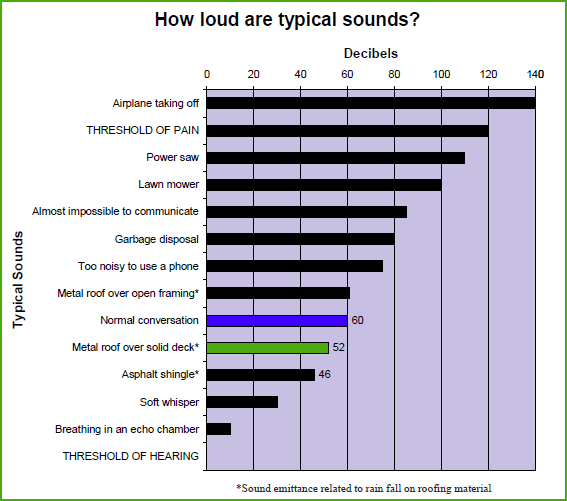Isn’t a metal roof noisy? It is one of the most frequently asked questions about metal roofing. The theory that a metal roof is “noisy” stems from the memory of a barn, or a patio awning, where there is nothing between an individual and the roof, except air.
The more adept one becomes at answering this question, no a metal roof isn’t noisy, the more one hears the response – Oh that’s too bad, I rather liked the sound of the rain hitting my grandparent’s old metal roof. In time off homeopathic fountains and sound machines, the sound of rain pattering on a rooftop is not necessarily classified as noise.
Noise is defined by Webster’s dictionary as Sound or a sound that is loud, disagreeable, or unwanted. Sound or sound pressure is measured in units known as decibels (dB). The softest sound the human ear can detect is measured at 0 dB, while the loudest sound is registered at more than 175 dB. Existing standards indicate that sound levels should not surpass 70 dB if general conversation is desired; whereas, frequent exposure to levels exceeding 85 dB will impair an individual’s hearing. Although this is not a technical paper on acoustical concepts, it bears mention that the human ear does not distinguish variations in sound until the sound pressure level has been increased by 8 dB.
A study was conducted by The Acoustic Group at the University of Luleå, Sweden, to determine the amount of sound emitted when rain falls on various roofing materials. The study concluded that metal did not register a significantly higher sound level than shingle. In fact, the sound differential between shingle and metal was only 6 dB.
The variation of sound pressure, as it relates to rain falling on a metal roof, is dependent upon various factors. The most important factor relates to the method of construction. A metal roof installed over open framing will register a louder sound than panels that are installed over a solid roof deck. The roof deck literally absorbs or muffles the sound.
It is with few exceptions that most metal roofing products on the market today are installed with some form of underlayment material that absorbs sound. Further, in a re-roof application, metal is often installed over an existing layer or two of shingles. Considering the multiple layers of shingles, roof deck, attic air space and the insulation above the ceiling, individuals who have metal roofs say they hear the rain on their skylights, not their metal roof.
Individuals who are looking for the solace of a gentle rain on their new metal roof could be disappointed. For this reason, contractors can answer their client’s question about noise by first determining whether the customer likes the sound of rain on the rooftop. If the answer is yes, then the roof can be installed to enhance the sound they desire. If they consider the sound to be noise, then one can assure them that a metal roof is no noisier than any other roofing material.



Very informative post. It will be very considerate for roofers to consider the noise being made by the rain. People have different preferences and it will totally increase the user experience if this aspect will be looked into before installation. Thank you.